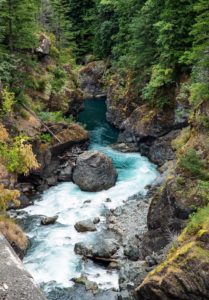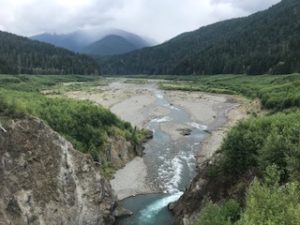
Restoration of the Elwha River, WA – by Bill Truslow Photography
When my husband Bill and I visited my brother in Seattle this July, we planned a side trip to Vancouver Island in British Columbia. Part of the journey took us to the Olympic Peninsula so that we could take the ferry to Victoria, BC. The Elwha River is in Olympic National Park and is a short drive from Port Angeles, WA. My brother, also a geologist, kept me up to date on the progress of the Elwha River restoration project and I had seen a movie on the removals during the New Hampshire Rivers Council Wild and Scenic film festival. The movie “Return of the River” chronicles the varying interests, the evolution of the project, and has amazing footage of the explosion to remove the upper dam on the river.
The National Park Service summarized the Elwha Dam Removal in this way
“For millennia, the Klallam people relied on fish nurtured by the Elwha River watershed. That relationship was largely severed in 1913, when the Elwha Dam was built, blocking fish runs five miles from the river mouth. Glines Canyon Dam was completed upstream in 1927. Though a state law required fish passage, both dams were built without it. Thousands of salmon no longer reached most of the Elwha valley.
But in 1992, Congress passed a law requiring restoration of this watershed and its fish, and authorizing dam removal. After careful planning, both dams were removed by 2014. Within months of dam removal, salmon were spawning in the park for the first time in 100 years! Look for them as you explore this wilderness valley. Or stop by the Glines Canyon Spillway Overlook to learn more of the story and witness how revegetation crews and nature are greening the exposed sediments of the drained reservoir. “
The river is flowing freely now, it has re-claimed the floodplain, and salmon are returning. I had wanted to see with my own eyes, the Elwha River and better understand the momentous change to the river since the dams on the river were removed in 2013. The floodplain included the access road to the dam which washed out in two places in 2016 and 2017 so we hiked the 8 mile round trip to the upper dam. As we consider dam removal of our many streams and rivers in New England, the example of the Elwha River restoration can help to keep us inspired.
